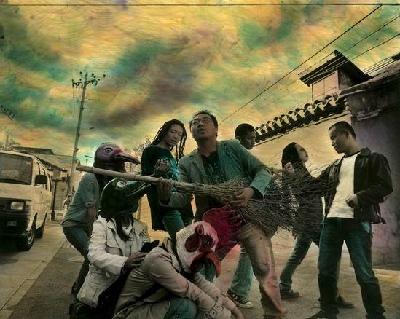Most people have the impression that rock has a "non-mainstream" or "semi-underground" status in China. It is out of tune with the government, or even “fighting” it. However, from the first Midi Music Festival to the Strawberry Music Festival, Inmusic Festival, Zebra Music Festival, Snow Mountain Music Festival and other music festivals in 2010, the attitude of the government has gradually changed from its initial rejection, suspicion and worry to acceptance, understanding and support.
 Source: image.baidu.com
Source: image.baidu.com
By 2009, "Southern Weekly" had always reported on the music festival in the Zhangbei grasslands of Hebei province. The relationship between this poor county and the rock music festival had attracted many people's attention. Taking the advantage of the defenseless grasslands, the government organized a rock festival, and the result lifted the poor county out of poverty immediately. It is now busy getting rich through culture and tourism. The case of Zhangbei has become a model in one sense. The governments of Yanqing district of Beijing, Mentougou district of Beijing, and Xiangcheng District of Suzhou and other areas have followed the example of Zhangbei, and have held rock music festivals. At present, there are about 40 music festivals in China, while last year there were only a dozen of them. The rock music festival has become an important part of building the cultural and tourist image of a city. Most festivals are held outdoors. Places like towering snow-capped mountains, vast grasslands, beautiful West Lake and the lush forest are the best sites to hold a rock festival. In the festival, people can enjoy the passion of music while embracing nature. Thus the festivals attract more and more young people. The local government also uses the festival to promote local tourism resources. From the themes of the rock festival in recent years, we can see a close relationship between the music festival and nature: the second Inmusic Festival with the theme of “Green Flag,” 2007 the second Midi Music Festival with the theme of “Green and Peace,” Zebra Music Festival with the logo of “50%” for the garbage classification. Through the rock music festival, some little-known natural attractions have become the object of tourists, and some well-known landscapes elevate their own cultural image through the festivals.
 Source: image.baidu.com
Source: image.baidu.com
Most rock music festivals are held on holidays. The participants of some music festival might achieve more than ten thousands. The influx of consumer groups stimulates the demand of local accommodation, food and beverage consumption and increases the local economic income. Therefore, local governments hold music festivals actively. They try their best to prepare the hardware facilities, not only constructing hotels and restaurants, but also importing advanced sound and stage equipment from foreign countries to ensure the perfect presentation of the festival. Some governments even appropriate huge funds to the music festival organizers to invite the most famous bands from throughout China and abroad to enhance the "gold content" of the music festivals. This approach greatly reduces the economic pressure of the festival organizers, and eases the predicament of recovering the cost only by the sale of tickets.
 Source: image.baidu.com
Source: image.baidu.com
Through the music festivals, the Helan Mountain area of Ningxia, Zhangbei County of Hebei, and Zhenjiang of Jiangsu have become popular. More and more cities have joined in the full swing of “Rock Project” and try to turn themselves to the Holy Land in the mind of the rock fans. The rock music festivals, however, should not be used totally as a tool to earn money. The eagerness for quick success and instant benefits might cause the antipathy of the fans. As a famous singer of China, Lao Lang, said, “Lots of cities plan to hold music festivals, but their purposes are different. Some really want to make a brand, and some want to publicize their cities. It is blameless. Meanwhile, it is inadvisable to hold the festivals when nothing is ready.”
Translated by Zhang Min
